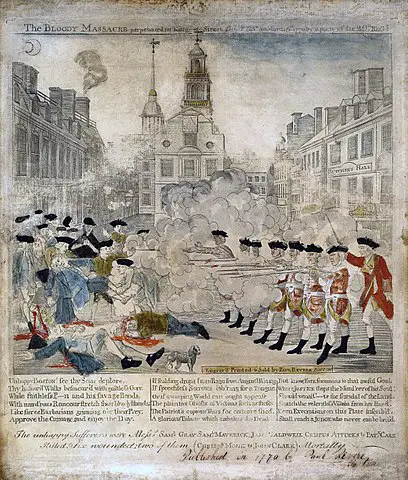The Boston Massacre
The Boston Massacre happened on March 5, 1770. It was a combination of events that included British soldiers present in Boston, Massachusetts, and anti-British feelings by the colonists.
When the British opened fire on a group of colonists that were throwing sticks and snowballs at them, five of the colonists were killed. This situation was followed by the increasing strain between the British and the colonists.
Just before this incident, the British Parliament had passed a number of taxation laws on the colonies without the benefit of the colonists being represented in Parliament.

The taxes were being placed on just about everything that the colonists used, including lead, paint, paper, glass, and tea. They weren’t allowed to pay taxes with colonial money, but only with British money.
- The colonists were angry because they felt the taxes were a violation of their rights. The British felt justified in taxing the colonists as a way to get paid for the expensive Seven Years’ War that the colonists benefitted from.
- With increased strain, Britain brought additional soldiers into many areas to try to keep the peace. This further outraged the colonists, and their anger was reaching a boiling point.
- On March 5, 1770, an argument happened in the evening between a few colonists that were outside of the Customs House in Boston and British Private Hugh White. The colonists were getting angrier and angrier and finally began to throw snowballs and sticks at the Private. It didn’t take long before a gathering of over fifty colonists joined them, and the British officer, Captain Thomas Preston, sent more British soldiers to try to keep order.
- When the colonists saw the British soldiers with their guns and bayonets, they began to dare the soldiers to fire at them. Captain Preston showed up an attempted to get the colonists to go home. Then an object was thrown from the crowd that hit one of the British soldiers, knocking him down. He then fired into the crowd, and after a few moments of silence, other soldiers also fired into the crowd. Three of the colonists were immediately killed, and two additional colonists died later from the wounds that they received.
- To avoid further problems, the acting Boston governor, Thomas Hutchison, got the crowd to leave. Arrests were made, including 8 British soldiers, one officer, and four civilian colonists. They were all charged with murder and thrown in jail. The British troops also left the city.
- The British soldiers and officials were in the Boston jail, and there was difficulty finding a lawyer that would allow them to have a fair trial. Although John Adams was an American patriot, he was also a lawyer and agreed to represent the British men.
- Adams’ argument in defense of the soldiers was that they felt their lives were in danger, and they had a right to defend themselves. The results of the trial followed with six soldiers found not-guilty, and two found guilty of manslaughter.
- Word of the Boston Massacre quickly spread throughout the colonies, and it angered them even more. The rallying cry of the Boston Massacre was shared, and the patriot group, the Sons of Liberty, made use of it as an example of what British rule brings.
- After the Boston Massacre, both the Patriots and the British tried to use newspapers as a tool of propaganda to show how bad the other side was.
- The Boston Massacre became one of the main actions that eventually spurred the American Revolution five years later.
Q&A:
Why were the British soldiers in Boston, Massachusetts?
To maintain the peace
Why was there tension between the colonists and the British?
The British imposed a series of taxes on the colonists that they objected to
How many colonists were shot by the British soldiers?
5
Who finally agreed to be the attorney for the British soldiers so that they could have a fair trial?
John Adams
How did the Sons of Liberty use the Boston Massacre to promote their cause?
A rallying cry to all of the colonies
How many years after the Boston Massacre was the American Revolution?
5



